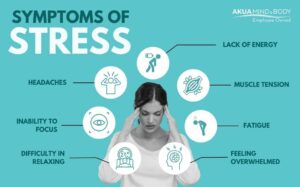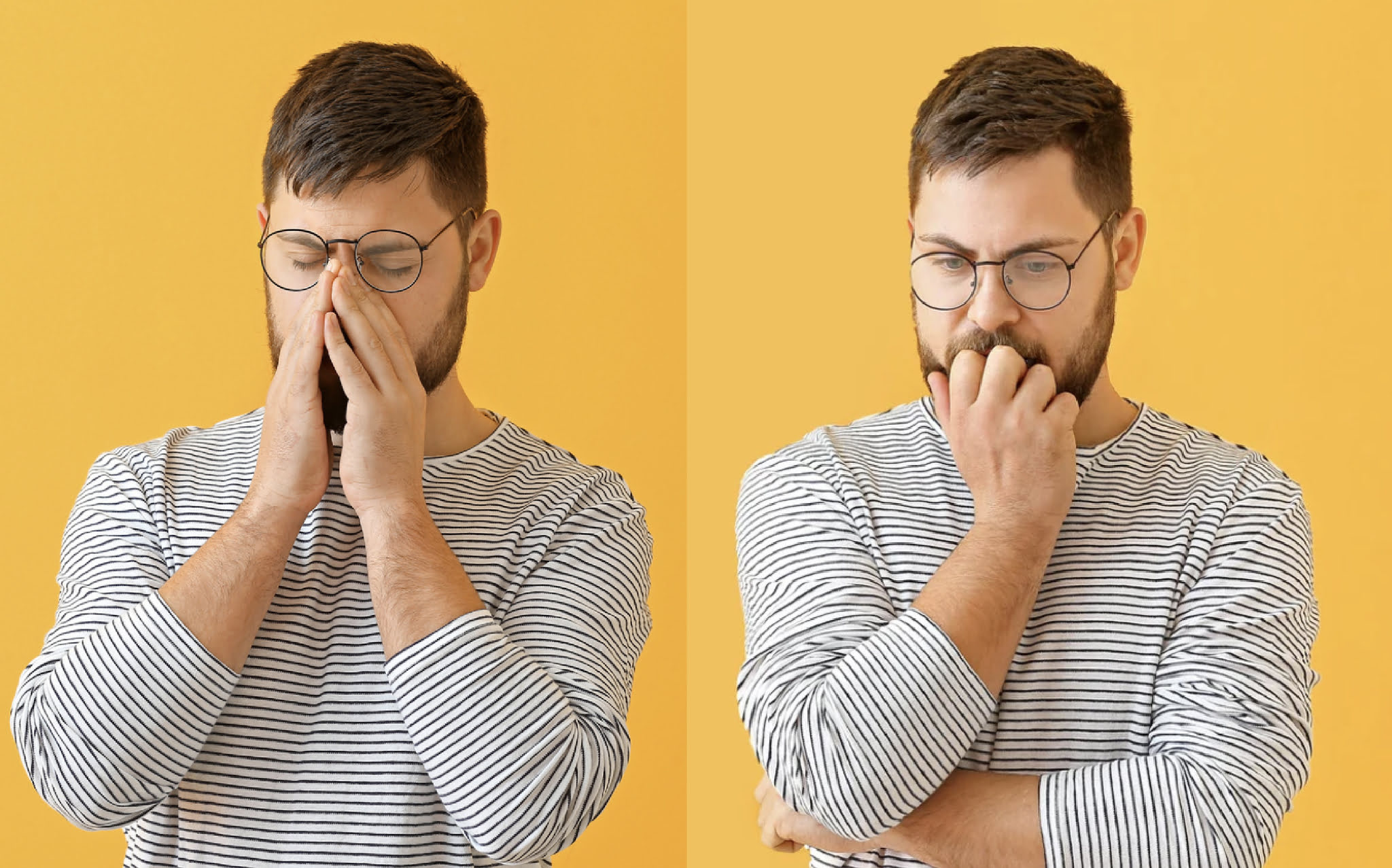Many things can make us anxious; politics, work, social media, family tension, and a 24-hour news cycle. Occasional mild anxiety is healthy and can even sometimes be motivating. A little bit of anxiety can keep us on our toes by getting us out of bed in the morning, making us wary of danger, and reminding us of our responsibilities. But what happens when this stress and anxiety interferes with multiple aspects of our daily life?
What happens when we can no longer perform our work tasks without worrying or can no longer drive the kids to school without being stressed out about traffic accidents? The defining characteristic between everyday anxiety and an anxiety disorder is that anxiety becomes a disorder when it gets in the way of your life, preventing you from doing the things you need or want to do every day.
Stress versus anxiety
Stress is a normal defense mechanism for survival. It is a response to an external factor, such as an impending deadline at work or an argument with a loved one, and it subsides once the situation has been resolved. Anxiety is an individual’s specific reaction to stress; its origin is internal. Anxiety is often thought of as the anticipation of future threats and is characterized as excessive fear. It manifests behaviorally.
It is normal to feel anxious and stressed out before a job interview, a big test, or a big trip or move. Still, when you begin to feel stressed about everyday tasks to the point that this stress is interfering with your job and/or your personal life, then this stress starts to turn into behavioral manifestations.
The relationship between stress and anxiety
Individuals under stress will eventually start to feel mental and physical symptoms, such as irritability, anger, fatigue, muscle pain, digestive troubles, and difficulty sleeping. Stress can often lead to anxiety, and these terms are often used interchangeably; however, there is a significant difference between stress and anxiety.
Anxiety is often confused with stress; however, anxiety is a mental health disorder defined by persistent, excessive worry that does not dissipate even if the underlying stressor is removed. Stress is the body’s reaction to a threat, whereas anxiety is the body’s reaction to stress. In other words, chronic stress can turn into anxiety over time, even when the underlying stressor is eliminated. As a result, it is important to recognize stress and adopt healthy coping skills to manage the underlying stressor to prevent an anxiety disorder.

Symptoms of stress
- Inability to focus
- Muscle tension
- Headaches
- Fatigue
- Lack of energy
- Feeling overwhelmed
- Having difficulty relaxing
Types of stress
There are multiple types of stress: acute stress, chronic stress, and episodic acute stress, which are defined by the following:
- Acute stress: Very short-term type of stress that is either positive or more distressing; this is the type of stress we most often encounter daily. Examples include sitting in traffic, neighbor drama, or running late for a meeting.
- Chronic stress: A long-term stress that seems never-ending and inescapable.
Examples include pressure from a toxic relationship, a demanding job, or past traumatic experiences. - Episodic acute stress: Acute stress seems to run rampant and be a way of life, creating a life of ongoing distress. Basically, when acute episodes of stress linger on for weeks or months.
Effects of stress
Stress can be carried out physically, resulting in headaches, muscle aches, and gastrointestinal symptoms. Physical exhaustion is also closely linked to mental fatigue. When many individuals become burned out at work or in their personal lives, they become more susceptible to becoming physically exhausted and sick. Our brain is like a muscle because it requires energy in the form of food and rest in the form of sleep. When we over-exercise our bodies, our muscles become sore, we are at risk for injuries such as shin splints and torn ligaments, and we feel fatigued. Our brain, just like a muscle, can be overworked when we are not taking care of our bodies properly by not eating well or obtaining adequate sleep.
When we are experiencing emotional turmoil and our stress levels begin to rise, either at work or in our personal lives, our cortisol levels are sky-high, which puts our bodies under stress. High cortisol levels enable us to work under pressure for a short time, but our bodies become depleted of energy, and our immune systems weaken. Our mind is equally important as our physical body. We need to take care of ourselves when we are under physical stress and emotional stress. Our bodies and minds will eventually become injured when either one is overworked or stressed.
How stress can affect your body
Health problems can occur if the stress response goes on for too long or if the stress turns into an anxiety disorder. With chronic stress or anxiety disorders, the body can eventually become weak, leading to problems in the immune system, digestion, sleep cycles, and reproductive functions. Individuals under chronic mental or emotional stress are more likely to have high blood pressure, heart disease, obesity, diabetes, stroke, gastritis, reflux, skin and hair problems, sexual dysfunction, and mental health disorders like anxiety and depression.
Anxiety disorders defined
The Anxiety and Depression Association of America states anxiety disorders are the most common mental illness in the United States, affecting 40 million adults. Anxiety disorders range from generalized anxiety and social anxiety to panic attacks and specific phobias. Obsessive-compulsive disorder and post-traumatic stress disorder were once considered anxiety disorders, but now they are listed under their categories in the DSM-V; however, both of these disorders do portray signs and symptoms that are seen in many anxiety disorders. One of the major red flags that you may be struggling with an anxiety disorder is the inability to take care of yourself or your home. Unable to keep up with household chores, neglecting your exercise routine, and forgetting to pay bills, are all red flags that your anxious thoughts and worries may be taking over your life to the point that you cannot complete your daily tasks.
Having feelings of anxiety regularly is not a standard way to live. The following are warning signs or red flags consistent with an anxiety disorder:
- You always feel tense
- You have problems concentrating
- You are late for deadlines, meetings, and appointments because you are “stuck in
- your head”
- You have trouble falling asleep or staying asleep
- You feel stressed and uneasy in social situations
- You experience sweating, racing heart, and trembling on regular occasions
- You cannot control your thoughts
- You feel nervous about things that you cannot control
- Unable to eat because of feelings of anxiety
- You cry or obsess over little things in life
- You run away from your problems
- You are terrified of trying new things
- You prefer to stay home rather than leave the house
- You no longer experience pleasure with the things that you enjoy most
- You feel out of control but want to always be in control
- You are experiencing fluctuations in your weight, chest pain, abdominal pain
- and/or shortness of breath
Why me?
Anxiety disorders are not your fault. There are many factors that are completely out of your hands. However, there are coping mechanisms that can help prevent anxiety signs and symptoms. Still, everyone is affected by anxiety in a different capacity, and therefore different coping mechanisms work for different individuals. Additionally, if you grew up in a stressful environment as a child, you may be more prone to anxiety compared to someone who grew up in a stable household. Your childhood, genetics, and past traumas are not your fault; neither are the mental health disorders that develop from unwanted triggers.




